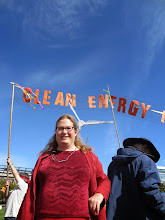SB43 would create a 500 Megawatt pilot program, while AB1014 would authorize 1000 Megawatts. Projects can be up to 20 Megawatts in size. 20% of the capacity is reserved for residential participants, and 20% for projects less than 1 Megawatt in areas affected by pollution or with socioeconomic vulnerability. It also prevents solar gardens from displacing prime farmland, and allows for many other types of renewable energy besides solar.
(The bill isn't perfect - as I read it, one 2012 provision that required 40% of subscribers to be in the same county as the solar garden was not included this year. But it is good enough to be deserving of support.)
The bill also addresses securities regulation, a factor that has been a significant barrier to implementation of community solar programs. Renewable energy subscriptions are exempted from the definition of a security. To my knowledge, if this language becomes law it will be the first time this essential step has been taken in the United States. (See below).
The full text of SB43 is available at the Solar Gardens Institute website.
SGI is sending a letter of support to the bill's sponsors. You may sign on to the letter by emailing sb43@solargardens.org with your name, city+state, and organizational affiliation. If you live in California, let us know the name of your state senator and assemblymember.
Now, more than ever, we need your support for our legislative campaigns for community solar. Please donate $25, $50, $100 or more by clicking the button below. Note that since we are advocating for a particular legislative outcome, the donation is NOT tax-deductible.
Dear Senator Wolk / Assemblymember Williams,
The Solar Gardens Institute (SGI), a national community solar advocacy organization, strongly supports SB43 and AB1014 as part of an effort to make solar energy more equable and available to all. If passed, the legislation would allow financial participation in solar projects to those who have shaded or poorly oriented roofs, renters, and those who would otherwise not be able to afford solar energy. SGI supports good community solar policy everywhere.
Our position on the bill is driven by our Mission Statement, Founding Principles, and Principles of Responsible Solar Development which can be viewed online at http://www.solargardens.org/about/.
We would note the following changes to the bill since its introduction in 2012 that are in keeping with our mission and principles:
- Exempting bill credits from securities regulation
- Establishing a 20% carve-out for residential customers
- Establishing a 20% carve-out for projects smaller than 1 Megawatt located in impacted and disadvantaged communities
- Including many different forms of renewable energy
One important amendment included in the 2012 bill seems not to have made it into the 2013 version. This is a provision that would require 40% of participants' capacity to be within the same county as the community renewable facility. SGI's principles would encourage local participation - after all, these are called "community" projects. We therefore ask this provision be restored.
Sincerely,
Joy Hughes, Founder, Solar Gardens Institute - Eastsound, Washington
---------------------------------------------------------------------------------------------------------------------
(3) Of the initial pilot program capacity:
(A) Twenty percent shall be reserved for projects of a size no
greater than one megawatt of alternating current, constructed in
areas previously identified by the California Environmental
Protection Agency as the most impacted and disadvantaged communities
for opportunities related to this chapter. These communities shall be
identified as census tracts that are identified within the top 20
percent of results from the best available cumulative impact
screening methodology by considering the following categories:
(i) Areas disproportionately affected by environmental pollution
and other hazards that can lead to negative public health effects,
exposure, or environmental degradation.
(ii) Areas with socioeconomic vulnerability.
(B) Twenty percent shall be reserved for initial subscription by
residential customers.
(A) Twenty percent shall be reserved for projects of a size no
greater than one megawatt of alternating current, constructed in
areas previously identified by the California Environmental
Protection Agency as the most impacted and disadvantaged communities
for opportunities related to this chapter. These communities shall be
identified as census tracts that are identified within the top 20
percent of results from the best available cumulative impact
screening methodology by considering the following categories:
(i) Areas disproportionately affected by environmental pollution
and other hazards that can lead to negative public health effects,
exposure, or environmental degradation.
(ii) Areas with socioeconomic vulnerability.
(B) Twenty percent shall be reserved for initial subscription by
residential customers.
---------------------------------------------------------------------------------
(b) "Security" does not include: (1) any beneficial interest in any voluntary inter vivos trust which is not created for the purpose of carrying on any business or solely for the purpose of voting, (2) any beneficial interest in any testamentary trust, (3) any insurance or endowment policy or annuity contract under which an insurance company admitted in this state promises to pay a sum of money (whether or not based upon the investment performance of a segregated fund) either in a lump sum or periodically for life or some other specified period, (4) any franchise subject to registration under the Franchise Investment Law (Division 5 (commencing with Section 31000)), or exempted from registration by Section 31100 or 31101, or (5) any right to a bill credit or interest of a participant in a community renewable energy facility pursuant to Chapter 7.5 (commencing with Section 2830) of Part 2 of Division 1 of the Public Utilities Code.



No comments:
Post a Comment